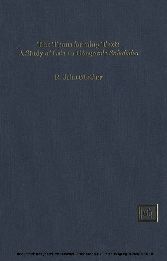Suchen und Finden
1. The Goatherds (p. 13)
The Dedicated Lyre
In "Gongora and the Footprints of the Voice" Mary Malcolm Gaylord discusses the famous opening lines of Gongora`s Soledades—specifically, the first several verses otfasDedicatoria alDuque deBejar—and, on the basis of these verses, "call[s] attention to the poetic utterance as a physical itinerary, one whose verbal markers (rhetorical, lexical, grammatical) point the way. . .toward sense [. . .]." (82) Functioning as a "material path, a path paved with words" the poem unites reader, narrator, and poet in a quest for understanding and comprehension ("the route to meaning") that, in steps ("pasos"), is fulfilled.
The physical itinerary toward meaning, associated with intellectual and spiritual trials leading to revelation, maps out a labyrinthine journey through various levels—explicit, subtle—of metamorphic imagery of life, death, regeneration: the relentless components of mutability or mudanza.
The presence of movement in the poem, then, not only manifests itself in distinctly physical terms and images, but also in related intellectual and emotional instances of transformation:
Pasos de un peregrino son errante
cuantos me dicto versos dulce Musa
en soledad confusa,
perdidos unos, otros inspirados.
jo Duque esclarecido!
[ ]
que a tu piedad Euterpe agradecida,
su canoro dara dulce instrumento,
cuando la Fama no su trompa al viento. (1-37)
The entire Dedicatoria is structured on a movement from violence to repose, a transition that leads the fictionalized Duke from the busying, sportive realm of hunting, to the relaxed, meditative world of music and poetry.
The Dedicatoria`s transformation from matters of the court to concerns of the country—from epic to lyric, from negotium to otium—relies on a rhetorical display of suspense that draws any reader—including the Duke—from the hurly-burly of everyday existence into a rapt state of contemplation worthy of Arion`s harp and Orpheus`s lyre.
To the reader—spellbound by the poem`s appeal to sight, sound, and touch—Gongora presents a meticulously crafted Arcadia, infused with the mundane realities of life and death, decay and rebirth. It is the very reality of transience which is turned into art, and which—as art— is made extraordinary and thus worth contemplating.
In addressing the Duke, the Dedicatoria`s speaker uses an invocation which spans twenty verses, and which defers any explicit reference to the Duke for slightly more than half of the Dedicatoria:
je tu que, de venablos impedido,
muros de abeto, almenas de diamante,
bates los monies, que de nieve armados,
Gigantes de cristal los teme el cielo,
jo Duque esclarecido! (5-26)
This phrase slowly reveals, line by suspenseful line, the climax of a hunting expedition. The first lines of the invocation portray the Duke surrounded by human artefacts ("de venablos impedido") and, as a result, by the people bearing the spears.
Alle Preise verstehen sich inklusive der gesetzlichen MwSt.







